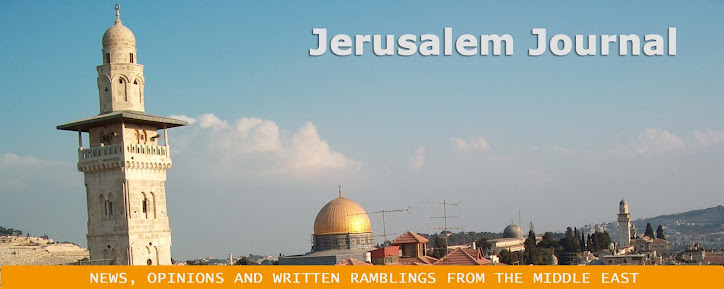May 7, 2009
Operation White Cloak is underway. Really, I could stop writing right there: I love the name 'White Cloak.'
Yes, this is the Israeli security detail for protecting the Pope, replete in his white robes, but without his Popemobile, deemed "not safe enough" by Israel's ultra-vigilant security. Israel is deploying 60,000 police officers and 20,000 secret service agents and soldiers during the week of the tour, most of them in Jerusalem.
Protecting the Pope is the most intense security detail for Israel, according to Raphael Ben-Hur, senior deputy general of the tourism ministry, even greater than that of visiting American presidents.
“The Pope is one of the most important people all over the world and we have to secure him,” he said.
I was here for U.S. Pres. George W. Bush's visit nearly a year ago to celebrate Israel's 60th anniversary. He was only here three days but the city was shut down. Certain streets were forced to evacuate and if any cars remained, they were towed. The entire neighborhood of the Central Bus Station, a major transportation hub, was desolate during Bush's speech at the convention center. I walked about a mile after the event until I could even find a taxi to catch. The neighborhood was vacated.
The Ministry of Tourism is expecting between 10,000 to 15,000 additional tourists in conjunction with Il Pappa's tour of the Holy Land. At the Nazareth mass, an outdoor arena will hold 40,000 people, while the Jerusalem mass will accommodate 5,000 to 6,000.
The State of Israel has alloted 43 million shekels (a little more than $10 million) for the trip. The Pontiff's official tour has been a good excuse for the three cities on his tour to get a much-needed facelift, just like the last papal tour in 2000 when John Paul II visited. Olive trees have been planted in the Kidron Valley in Jerusalem. The walkway down to the mass site - in the valley between the Eastern Gate of the Old City and the Mount of Olives - is getting repaved so as to accommodate the Popemobile. The area was once a haven for drug addicts and dealers. Now it is a massive construction site which must be done for Tuesday's mass.
Nir Barkat, Jerusalem’s mayor, has a vested interest in the trip too because it shines the spotlight on his city. Bringing 1 million tourist s a year to Israel’s capital was a stated goal of Barkat’s campaign. This international exposure should be a boon to the city.
Already, an extra 10,000 to 15,000 tourists are expected in conjunction with the pope’s visit.
In Nazareth, an amphitheater for the mass has been built along with a helicopter pad, according to a reporter who visited there. New roads, sidewalks, and other general construction needed since the founding of the state, she said. I can't wait to see it myself. Nazareth, the city where Jesus was raised, now has a Muslim instead of Christian majority, a switch in the last few decades.
As I've reported before, Christians in Israel and the Palestinian territories are leaving for various reasons. Here is some info from the website
Palestine Facts:
After World War II, Bethlehem, the birthplace of Jesus, was 80% Christian and Nazareth 60%. Now those percentages are 20% and 30% respectively, and are shrinking. Jerusalem Christians were a plurality in the 1920s; today, they number under 2 percent of the city's population.
Serious violations of religious freedom are reported from within the Palestinian Authority, especially the persecution of Muslims who have converted to Christianity. In the Christian town of Bet Jella, a human rights lawyer reported brutal interrogation methods and arbitrary arrests based on fabricated criminal charges against Muslims who have converted to Christianity and their families. His report includes testimony about torture from victims who were terrified to criticize the Palestinian Authority and their secret police.
In Nazareth, the Christian population has decreased dramatically due to the rise and spread of militant Islam. The Islamic Movement (a radical Muslim group) has demanded the construction of a mosque near the Church of the Annunciation, a mosque even some moderate Muslims oppose. On Easter, 1999, the Muslim group burned Christian stores and targeted Christians over the issue; attempts to intervene were frustrated because Christians are terrified to speak out.
Hundreds of Christian families have left Palestinian towns like Bet Jella and Bethlehem during the al-Aqsa intifada, caught literally in the crossfire between Palestinians and Israelis. On the West Bank, a nearly-permanent Muslim boycott of Christian businesses is achieving its objective: driving the Christians to emigrate.
In October 2000, Christians were attacked in Gaza after a Palestinian Muslim leader called for a "jihad" against both Jews and Christians.
In February 2002 a Muslim mob, including Palestinian Authority Special Forces, burned Christian businesses and attempted to destroy the Greek Orthodox and Roman Catholic churches in Ramallah. The attack occurred after a Christian man killed a Muslim while being pursued by a Muslim gang because he refused to pay protection money for safe passage to his home.
Christians in the Palestinian territories will also get to see the Pope - about 200 Gazans have received passes to attend the mass in Bethlehem. I had thought there were only 2,000 Christians of the 1.6 million residents there, but latest statistics claim there are 3,800. I'm not sure that these passes were actually issued either.


